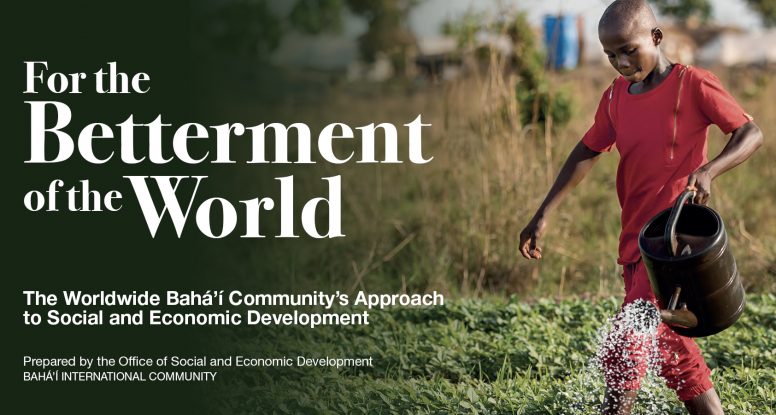
For the Betterment of the World: A publication that highlights fundamental concepts that guide Bahá’í efforts in social action
All images on this page ©2021 Bahá’í International Community.
About the publication
The following description is from BahaiBookstore.com.
For the Betterment of the World, prepared by the Office of Social and Economic Development* at the Bahá’í World Centre, highlights fundamental concepts that guide Bahá’í efforts in social action.
Much of the publication is dedicated to providing practical examples of projects undertaken in diverse parts of the world. It describes a sampling of Bahá’í development endeavors across a broad spectrum, ranging from grassroots efforts of limited duration undertaken by individuals or small groups, to sophisticated programs of social and economic development implemented by Bahá’í-inspired nongovernmental organizations. The publication also explains how, most often, development endeavors emerge and advance within localities that have a pronounced sense of community and a growing collective consciousness.
Bahá’í social and economic development initiatives address various aspects of community life, and the publication explores some of these, such as education, health, agriculture, the economic life of communities, arts and media, and the advancement of women. Regardless of the specific nature or scale of an initiative, Bahá’í endeavors for social and economic development operate on the principle that populations should be the protagonists of their own material, spiritual, and intellectual advancement, not just recipients of aid or mere participants. All Bahá’í-inspired initiatives are motivated by a desire to serve humanity and seek to promote the social and material well-being of all people.
Visit BahaiBookstore.com to download a free PDF, or purchase a printed copy of the publication.
Excerpts from the publication
— Introduction —
 Bahá’í efforts in the area of development seek to promote the social and material well-being of people of all walks of life, whatever their beliefs or background. Such endeavors are motivated by the desire to serve humanity and contribute to constructive social change. Together they represent a growing process of learning concerned with the application of the teachings of Bahá’u’lláh, along with knowledge accumulated in different fields of human endeavor, to social reality. Social action is pursued with the conviction that every population has the right and responsibility to mark out the path of its own progress. Indeed, every people and nation has a vital contribution to make in constructing a new society characterized by principles such as harmony, justice, and prosperity.
Bahá’í efforts in the area of development seek to promote the social and material well-being of people of all walks of life, whatever their beliefs or background. Such endeavors are motivated by the desire to serve humanity and contribute to constructive social change. Together they represent a growing process of learning concerned with the application of the teachings of Bahá’u’lláh, along with knowledge accumulated in different fields of human endeavor, to social reality. Social action is pursued with the conviction that every population has the right and responsibility to mark out the path of its own progress. Indeed, every people and nation has a vital contribution to make in constructing a new society characterized by principles such as harmony, justice, and prosperity.
This booklet describes the ongoing process of learning about development from the local to the global level. It offers an illustration of how Bahá’í social and economic development is being carried out in practice. The sections that immediately follow provide a brief discussion on some of the main concepts that guide Bahá’í activities in the sphere of development and describe certain elements of the emerging approach being adopted throughout the world and being refined through experience.
Foundations
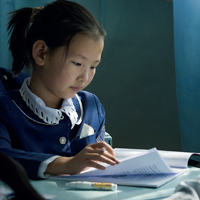 The Bahá’í community’s commitment to social and economic development is rooted in its sacred scriptures, which state that all human beings “have been created to carry forward an ever-advancing civilization.” Bahá’u’lláh wrote, “Be anxiously concerned with the needs of the age ye live in, and center your deliberations on its exigencies and requirements.” Fundamental to Bahá’í belief is the conviction that every person, every people, every nation has a part to play in building a peaceful and prosperous global society.
The Bahá’í community’s commitment to social and economic development is rooted in its sacred scriptures, which state that all human beings “have been created to carry forward an ever-advancing civilization.” Bahá’u’lláh wrote, “Be anxiously concerned with the needs of the age ye live in, and center your deliberations on its exigencies and requirements.” Fundamental to Bahá’í belief is the conviction that every person, every people, every nation has a part to play in building a peaceful and prosperous global society.
Concept
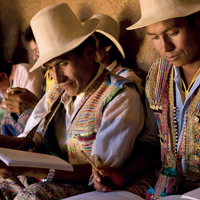 Bahá’ís view development as a global enterprise whose purpose is to bring prosperity to all peoples, an enterprise that must pursue its aim in the context of an emerging world civilization. Humanity, the Bahá’í writings explain, is experiencing an age of transition best described as a passage from collective childhood to collective maturity. The revolutionary changes that are occurring with bewildering swiftness in every department of life assume their real meaning in this light. During this period, the barriers raised by the thoughts, attitudes, and habits of the childhood of humankind are gradually being uprooted, and the structures of a new civilization that can reflect the powers of adulthood are taking shape.
Bahá’ís view development as a global enterprise whose purpose is to bring prosperity to all peoples, an enterprise that must pursue its aim in the context of an emerging world civilization. Humanity, the Bahá’í writings explain, is experiencing an age of transition best described as a passage from collective childhood to collective maturity. The revolutionary changes that are occurring with bewildering swiftness in every department of life assume their real meaning in this light. During this period, the barriers raised by the thoughts, attitudes, and habits of the childhood of humankind are gradually being uprooted, and the structures of a new civilization that can reflect the powers of adulthood are taking shape.
Approach
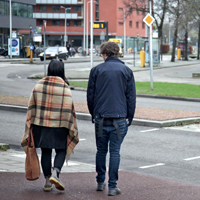 Bahá’í development activities are governed by certain underlying principles. In the Bahá’í Faith, proselytizing is prohibited, and development projects are not conducted for the purpose of public relations or as a means of converting people. In the appropriate context, funding for projects of a humanitarian nature can be accepted from government and donor agencies, but Bahá’ís do not accept or use funds from outside sources for the progress of their internal community affairs. There are, of course, opportunities for people to learn about the precepts of the Faith and to join it; so, too, there are a range of community activities, including those for worship and for education, in which all are welcome to take part. Development activities are, however, intended to involve Bahá’í communities in disinterested service to humanity.
Bahá’í development activities are governed by certain underlying principles. In the Bahá’í Faith, proselytizing is prohibited, and development projects are not conducted for the purpose of public relations or as a means of converting people. In the appropriate context, funding for projects of a humanitarian nature can be accepted from government and donor agencies, but Bahá’ís do not accept or use funds from outside sources for the progress of their internal community affairs. There are, of course, opportunities for people to learn about the precepts of the Faith and to join it; so, too, there are a range of community activities, including those for worship and for education, in which all are welcome to take part. Development activities are, however, intended to involve Bahá’í communities in disinterested service to humanity.
— Overview of Bahá’í Development Activities —
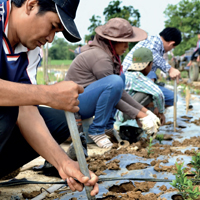 Bahá’í efforts in the field of development comprise a spectrum of activities. Generally speaking, they are initiated by individuals and small groups of friends in a locality, or by the Faith’s administrative institutions—local or national governing councils. The vast majority are simple grassroots endeavors of limited duration. Conservative estimates indicate that there are close to 40,000 such activities undertaken over the course of a year, a small number of which are described in the section titled “First Stirrings” (page 12). Some efforts evolve into projects of a more sustained nature, with a commensurate degree of administrative structure. Examples may include schools, radio stations, and community gardens. Over 1,400 sustained projects of this scale are currently being carried out addressing any one of several areas of community life such as education, health, agriculture, or media. In more than 130 instances, projects have developed further—typically over the course of many years coordinating a growing number of lines of action—and taken the form of nonprofit, nongovernmental organizations. Generally referred to as “Bahá’í-inspired organizations,” these entities operate at a higher level of sophistication and often manage several programs and projects. The section titled “Growing Complexity” (page 17) offers a few examples of such efforts. The map that follows provides an illustration of the scale of these various types of activity in countries around the world.
Bahá’í efforts in the field of development comprise a spectrum of activities. Generally speaking, they are initiated by individuals and small groups of friends in a locality, or by the Faith’s administrative institutions—local or national governing councils. The vast majority are simple grassroots endeavors of limited duration. Conservative estimates indicate that there are close to 40,000 such activities undertaken over the course of a year, a small number of which are described in the section titled “First Stirrings” (page 12). Some efforts evolve into projects of a more sustained nature, with a commensurate degree of administrative structure. Examples may include schools, radio stations, and community gardens. Over 1,400 sustained projects of this scale are currently being carried out addressing any one of several areas of community life such as education, health, agriculture, or media. In more than 130 instances, projects have developed further—typically over the course of many years coordinating a growing number of lines of action—and taken the form of nonprofit, nongovernmental organizations. Generally referred to as “Bahá’í-inspired organizations,” these entities operate at a higher level of sophistication and often manage several programs and projects. The section titled “Growing Complexity” (page 17) offers a few examples of such efforts. The map that follows provides an illustration of the scale of these various types of activity in countries around the world.
Regardless of where along the spectrum it falls, the involvement of Bahá’ís in efforts of social action represents an attempt to apply concepts and principles from the Bahá’í writings to improve some aspect of the social or economic life of their communities. Among these concepts and principles are the oneness of humankind, the equality of men and women, the elimination of all forms of prejudice, the harmony between science and religion, the inherent nobility of the human being, the recognition that every people has the right and responsibility to be the protagonist of its own development, the need for universal education, and the conviction that individuals are imbued with a twofold moral purpose: to develop and express their inherent potentialities and to contribute to the betterment of society.
First Stirrings
 Bahá’ís live and work in tens of thousands of localities spread across every continent of the globe. Viewed together, they can be said to represent the diversity of the entire human race. Wherever they reside, Bahá’í families and friends engage in efforts to draw insights from the Bahá’í Writings and to apply them to the material and spiritual progress of their communities. The pattern of community life that they strive to create is one in which acts of worship and a diversity of activities that promote the common good are woven together, and where all are free to participate, regardless of religious background, social standing, gender, or race.
Bahá’ís live and work in tens of thousands of localities spread across every continent of the globe. Viewed together, they can be said to represent the diversity of the entire human race. Wherever they reside, Bahá’í families and friends engage in efforts to draw insights from the Bahá’í Writings and to apply them to the material and spiritual progress of their communities. The pattern of community life that they strive to create is one in which acts of worship and a diversity of activities that promote the common good are woven together, and where all are free to participate, regardless of religious background, social standing, gender, or race.
Growing Complexity
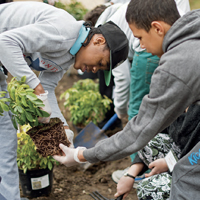 In addition to tens of thousands of grassroots initiatives, Bahá’ís—often working shoulder to shoulder with friends and other like-minded individuals—are engaged in over 1,400 ongoing projects that are larger in scope. Some emerge from smaller efforts at the local level, while others are established as structured projects in the communities they serve from the outset. Sustainability is a natural feature of a project that emerges organically from a grassroots effort. Where a project is introduced into a community, particular care is taken to ensure that its scope does not exceed local capacity to sustain it.
In addition to tens of thousands of grassroots initiatives, Bahá’ís—often working shoulder to shoulder with friends and other like-minded individuals—are engaged in over 1,400 ongoing projects that are larger in scope. Some emerge from smaller efforts at the local level, while others are established as structured projects in the communities they serve from the outset. Sustainability is a natural feature of a project that emerges organically from a grassroots effort. Where a project is introduced into a community, particular care is taken to ensure that its scope does not exceed local capacity to sustain it.
— Areas of Action —
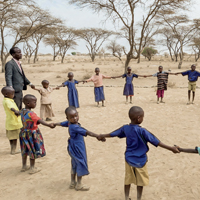 As described in the foregoing pages, Bahá’í development activities comprise a broad spectrum. They range from simple grassroots efforts of limited duration undertaken by individuals or small groups of friends, to programs of social and economic development with a high level of sophistication implemented by Bahá’í-inspired nongovernmental organizations. These activities represent responses to the needs of the particular community in which they are initiated. They may be related to one or more areas, such as agriculture, education, arts and media, health, the local economy, and the advancement of women. The pages that follow describe a selection of Bahá’í endeavors in these areas of action. The efforts profiled within each area are by no means exhaustive—they merely serve to provide a glimpse into the range and diversity of activities under way within that area. Bahá’í development activities concerned with one of several other aspects of development, such as the environment, language and migration, and the channeling of funds, have not been included here but are no less significant.
As described in the foregoing pages, Bahá’í development activities comprise a broad spectrum. They range from simple grassroots efforts of limited duration undertaken by individuals or small groups of friends, to programs of social and economic development with a high level of sophistication implemented by Bahá’í-inspired nongovernmental organizations. These activities represent responses to the needs of the particular community in which they are initiated. They may be related to one or more areas, such as agriculture, education, arts and media, health, the local economy, and the advancement of women. The pages that follow describe a selection of Bahá’í endeavors in these areas of action. The efforts profiled within each area are by no means exhaustive—they merely serve to provide a glimpse into the range and diversity of activities under way within that area. Bahá’í development activities concerned with one of several other aspects of development, such as the environment, language and migration, and the channeling of funds, have not been included here but are no less significant.
Education
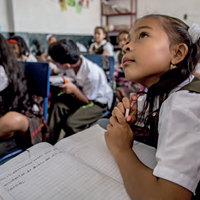 The Bahá’í Writings place a special emphasis on the importance of education, describing it as the “primary, the most urgent requirement” for achieving the prosperity of nations. Bahá’u’lláh states: “Knowledge is as wings to man’s life, and a ladder for his ascent. Its acquisition is incumbent upon everyone.” “Every child is potentially the light of the world—and at the same time its darkness,” ‘Abdu’l-Bahá adds, “wherefore must the question of education be accounted as of primary importance.” He further writes: “The education and training of children is among the most meritorious acts of humankind and draweth down the grace and favor of the All-Merciful, for education is the indispensable foundation of all human excellence and alloweth man to work his way to the heights of abiding glory.”
The Bahá’í Writings place a special emphasis on the importance of education, describing it as the “primary, the most urgent requirement” for achieving the prosperity of nations. Bahá’u’lláh states: “Knowledge is as wings to man’s life, and a ladder for his ascent. Its acquisition is incumbent upon everyone.” “Every child is potentially the light of the world—and at the same time its darkness,” ‘Abdu’l-Bahá adds, “wherefore must the question of education be accounted as of primary importance.” He further writes: “The education and training of children is among the most meritorious acts of humankind and draweth down the grace and favor of the All-Merciful, for education is the indispensable foundation of all human excellence and alloweth man to work his way to the heights of abiding glory.”
Health
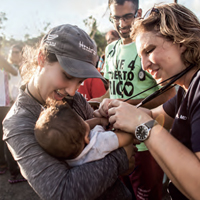 Bahá’í endeavors in the field of health strive to assist local populations to develop the capacity to address a growing range of local health concerns. Initiatives in this area take diverse forms including the creation of hospitals, clinics, and Bahá’í medical associations, the organization of events such as medical camps and campaigns to raise awareness about habits and practices that promote health, the implementation of health-education programs in schools, and the development of programs to train community health workers who can help bridge the gap between health needs at the grassroots and medical services of government agencies. All Bahá’í efforts in the area of health envision the development of a culture in which the physical and spiritual well-being of the community becomes the concern of a growing number of its members, who are able to apply scientific knowledge and spiritual principles to an expanding range of local health issues. A few examples of initiatives that contribute to enhancing the health of communities are provided below.
Bahá’í endeavors in the field of health strive to assist local populations to develop the capacity to address a growing range of local health concerns. Initiatives in this area take diverse forms including the creation of hospitals, clinics, and Bahá’í medical associations, the organization of events such as medical camps and campaigns to raise awareness about habits and practices that promote health, the implementation of health-education programs in schools, and the development of programs to train community health workers who can help bridge the gap between health needs at the grassroots and medical services of government agencies. All Bahá’í efforts in the area of health envision the development of a culture in which the physical and spiritual well-being of the community becomes the concern of a growing number of its members, who are able to apply scientific knowledge and spiritual principles to an expanding range of local health issues. A few examples of initiatives that contribute to enhancing the health of communities are provided below.
Agriculture
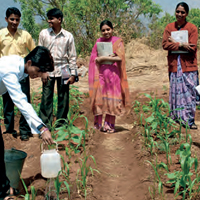 The Bahá’í teachings place agriculture at the heart of community life, and urge that a special regard be paid to the advancement of this field. “The fundamental basis of the community,” ‘Abdu’l-Bahá states, “is agriculture, tillage of the soil. All must be producers.”
The Bahá’í teachings place agriculture at the heart of community life, and urge that a special regard be paid to the advancement of this field. “The fundamental basis of the community,” ‘Abdu’l-Bahá states, “is agriculture, tillage of the soil. All must be producers.”
Economic Life of Communities
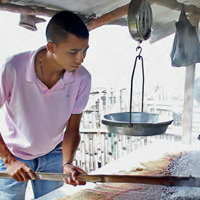 Among the basic tenets of the Bahá’í Faith is the elimination of extremes of wealth and poverty by promoting just economic systems and the voluntary striving of everyone, rich and poor. Bahá’ís everywhere are called on to learn about how to advance collective prosperity through the implementation of methods and approaches that promote unity and justice, as well as the application to economic affairs of such spiritual principles and concepts as generosity, trustworthiness, and integrity. A handful of examples of activities that have contributed in one or another way to enhancing the economic life of families and communities, albeit modestly, are provided below.
Among the basic tenets of the Bahá’í Faith is the elimination of extremes of wealth and poverty by promoting just economic systems and the voluntary striving of everyone, rich and poor. Bahá’ís everywhere are called on to learn about how to advance collective prosperity through the implementation of methods and approaches that promote unity and justice, as well as the application to economic affairs of such spiritual principles and concepts as generosity, trustworthiness, and integrity. A handful of examples of activities that have contributed in one or another way to enhancing the economic life of families and communities, albeit modestly, are provided below.
Arts and Media
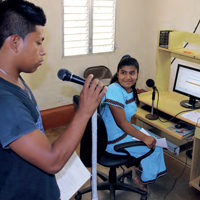 The Bahá’í Writings give particular significance to the arts, asserting their capacity to “uplift the world of being” and to “awaken noble sentiments” among the masses of people. Bahá’í development efforts that utilize arts and media, then, use various means of communication to help inspire high aims and raise consciousness about principles pertinent to the material and spiritual progress of a population. They attempt to give concepts and themes drawn from the principles of the Faith expression in new forms in order to assist in effecting constructive social change. A small selection of such efforts is described below.
The Bahá’í Writings give particular significance to the arts, asserting their capacity to “uplift the world of being” and to “awaken noble sentiments” among the masses of people. Bahá’í development efforts that utilize arts and media, then, use various means of communication to help inspire high aims and raise consciousness about principles pertinent to the material and spiritual progress of a population. They attempt to give concepts and themes drawn from the principles of the Faith expression in new forms in order to assist in effecting constructive social change. A small selection of such efforts is described below.
Advancement of Women
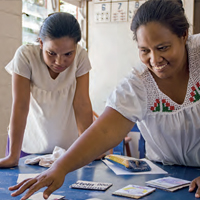 The equality of men and women is another cardinal principle of the Bahá’í Faith. “The world of humanity has two wings—one is women and the other men,” ‘Abdu’l-Bahá wrote. “Not until both wings are equally developed can the bird fly.” Intrinsic to every instance of social action undertaken by Bahá’ís, regardless of the area of action it strives to address, is a commitment to the goal of ensuring that women and men are allowed to advance shoulder to shoulder in all fields of human endeavor—scientific, political, economic, social, and cultural. In addition, certain programs have focused specifically on the advancement of women by, for instance, providing education to women and girls to assist them to take their rightful place in society, striving to eliminate prejudices against women, and establishing mechanisms to protect their well-being.
The equality of men and women is another cardinal principle of the Bahá’í Faith. “The world of humanity has two wings—one is women and the other men,” ‘Abdu’l-Bahá wrote. “Not until both wings are equally developed can the bird fly.” Intrinsic to every instance of social action undertaken by Bahá’ís, regardless of the area of action it strives to address, is a commitment to the goal of ensuring that women and men are allowed to advance shoulder to shoulder in all fields of human endeavor—scientific, political, economic, social, and cultural. In addition, certain programs have focused specifically on the advancement of women by, for instance, providing education to women and girls to assist them to take their rightful place in society, striving to eliminate prejudices against women, and establishing mechanisms to protect their well-being.
— Systematization of Learning —
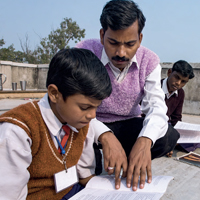 As indicated previously, learning is a central concern for every effort of social and economic development. Those involved strive that their activities evolve through an ongoing process of consultation, study, action, and reflection on action. In such a process, adjustments are made in response to objective analysis of experience, changing circumstances, and regular reflection on the meaning and implications of the writings of the Faith.
As indicated previously, learning is a central concern for every effort of social and economic development. Those involved strive that their activities evolve through an ongoing process of consultation, study, action, and reflection on action. In such a process, adjustments are made in response to objective analysis of experience, changing circumstances, and regular reflection on the meaning and implications of the writings of the Faith.
A process of learning at the local level, however, will remain limited in its efficacy if it is not connected to a body of knowledge informed by a broader process of learning. The role of the Office of Social and Economic Development (OSED) at the Faith’s world headquarters in Haifa, Israel, assumes particular significance in this light. The agency has been established to facilitate learning about development theory and practice in the Bahá’í community (see page 7). The functions it performs provide it with the perspective needed to gather and systematize learning about development taking place in Bahá’í communities around the world. When it identifies certain approaches and methodologies that are achieving particularly good results in some area of action, OSED arranges for pilot projects to be launched in different continents, the aim being to refine the content and methods and assemble them in a tested program. The program is then disseminated to countries where conditions allow for its implementation so that national Bahá’í communities can adapt it to their specific needs. As the number of institutions involved in carrying out the program grows, arrangements and structures for facilitating the flow of information and learning evolve accordingly, ensuring that communities around the world not only benefit from the program, but can also contribute to its further advancement.
To one or another extent, over the last few decades, efforts to systematize learning have been under way with respect to each of the areas described in the previous section, including arts and media, agricultural research, education, health, and community banking. It is expected that, over time, as more and more Bahá’í-inspired organizations emerge with the capacity to generate knowledge regarding various aspects of the development of their respective regions, their experience will give rise to new insights and programs that demonstrate their effectiveness in practice and could have application in other contexts.
The examples in the following section represent some of the fruits of efforts to systematize learning in the area of education.
Promotion of Community Schools through Teacher Training
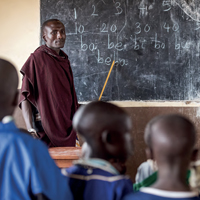 A pressing concern of the Bahá’í community over the decades has been the extension of pre- and primary school level academic instruction in regions of the world where the reach of the national education system is significantly limited. In the 1970s and early 1980s, simultaneous to the introduction by the Bahá’í community of large academic schools throughout the world, a global campaign was launched to promote tutorial schools—schools with modest facilities, typically in rural settings, and usually managed by local Bahá’í institutions. Numerous Bahá’í communities around the world were successful in establishing such schools. However, in the absence of institutional capacity at the regional or national levels to support their continued progress, it proved impossible to sustain them.
A pressing concern of the Bahá’í community over the decades has been the extension of pre- and primary school level academic instruction in regions of the world where the reach of the national education system is significantly limited. In the 1970s and early 1980s, simultaneous to the introduction by the Bahá’í community of large academic schools throughout the world, a global campaign was launched to promote tutorial schools—schools with modest facilities, typically in rural settings, and usually managed by local Bahá’í institutions. Numerous Bahá’í communities around the world were successful in establishing such schools. However, in the absence of institutional capacity at the regional or national levels to support their continued progress, it proved impossible to sustain them.
The Moral and Spiritual Empowerment of Junior Youth
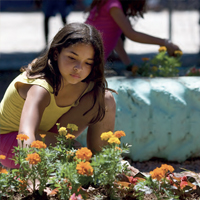 In the mid-1990s, a group of individuals were invited by OSED to analyze the experience gained by Bahá’í communities in promoting literacy. On this basis, pilot literacy projects were created in a number of countries. In subsequent consultations which were arranged to share observations and reflect on achievements, it became increasingly clear to the group that junior youth aged between, say, 12 and 15, had a particular idealism and energy, and a special receptivity to programs that enhance the power of expression. The junior youth spiritual empowerment program was developed as a result and continues to evolve through experience worldwide. Beyond instructions in the simple mechanics of reading and writing, the program seeks to endow young people in this age group with the capabilities of reading with good comprehension and expressing thoughts clearly and eloquently. Emphasis is placed on the need for positive words and thoughts to be accompanied by pure deeds.
In the mid-1990s, a group of individuals were invited by OSED to analyze the experience gained by Bahá’í communities in promoting literacy. On this basis, pilot literacy projects were created in a number of countries. In subsequent consultations which were arranged to share observations and reflect on achievements, it became increasingly clear to the group that junior youth aged between, say, 12 and 15, had a particular idealism and energy, and a special receptivity to programs that enhance the power of expression. The junior youth spiritual empowerment program was developed as a result and continues to evolve through experience worldwide. Beyond instructions in the simple mechanics of reading and writing, the program seeks to endow young people in this age group with the capabilities of reading with good comprehension and expressing thoughts clearly and eloquently. Emphasis is placed on the need for positive words and thoughts to be accompanied by pure deeds.
Preparation for Social Action Program
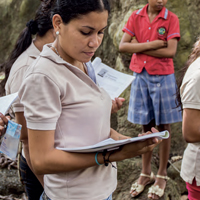 Through many years of research and action to address the needs of rural populations in Colombia, Fundación para la Aplicación y Enseñanza de las Ciencias (FUNDAEC), a Bahá’í-inspired organization based in Cali, developed an alternative secondary tutorial school system that aimed at building the capacity of young people to become protagonists of their own development. The “Sistema de Aprendizaje Tutorial” (SAT) program has been offered for more than three decades, reaching well over 100,000 students in Colombia alone and more recently being implemented in several countries in Latin America as a fully accredited, formal yet flexible option for secondary education recognized by government.
Through many years of research and action to address the needs of rural populations in Colombia, Fundación para la Aplicación y Enseñanza de las Ciencias (FUNDAEC), a Bahá’í-inspired organization based in Cali, developed an alternative secondary tutorial school system that aimed at building the capacity of young people to become protagonists of their own development. The “Sistema de Aprendizaje Tutorial” (SAT) program has been offered for more than three decades, reaching well over 100,000 students in Colombia alone and more recently being implemented in several countries in Latin America as a fully accredited, formal yet flexible option for secondary education recognized by government.
— Development Discourse —
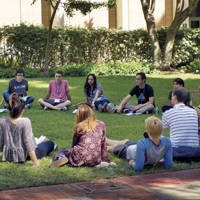 For the Bahá’í community the expanding network of activities described in the foregoing pages has had significance beyond the immediate benefits
For the Bahá’í community the expanding network of activities described in the foregoing pages has had significance beyond the immediate benefits
in the communities in which they operate. The experience of applying principles found in the writings of the Bahá’í Faith to a wide range of situations has enabled the Bahá’í community to progressively gain insight into the current challenges in the development field and equipped it to contribute ever more confidently to the global discourse taking place. It should be noted that the purpose of Bahá’í participation in discourses is not to persuade others to accept a Bahá’í position on this or that subject. Nor is effort in this area of endeavor pursued as a public relations activity or an academic exercise. Rather, Bahá’ís are eager to share what they are learning in their efforts to apply Bahá’u’lláh’s teachings to contribute toward the advancement of civilization and to learn with and from other like-minded individuals and groups in a range of settings around the world.
Contributing to Development Discourse at Various Levels
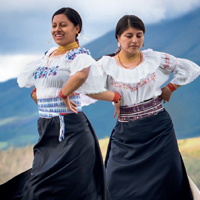 At any given moment, and in social spaces at all levels of society, there are ongoing conversations concerned with various aspects of humanity’s well-being and progress. At the local level, the involvement of Bahá’ís in conversations relevant to social progress is a natural part of their community-building efforts. Bahá’í-inspired development agencies also contribute to discourses pertinent to their work. While such an orientation is generally present from the earliest stages of an agency’s efforts, opportunities to participate in relevant conversations and fora grow naturally together with an agency’s accumulating experience (see, for instance, page 21).
At any given moment, and in social spaces at all levels of society, there are ongoing conversations concerned with various aspects of humanity’s well-being and progress. At the local level, the involvement of Bahá’ís in conversations relevant to social progress is a natural part of their community-building efforts. Bahá’í-inspired development agencies also contribute to discourses pertinent to their work. While such an orientation is generally present from the earliest stages of an agency’s efforts, opportunities to participate in relevant conversations and fora grow naturally together with an agency’s accumulating experience (see, for instance, page 21).
* (from BahaiPedia.org) The Office of Social and Economic Development was an office of the Bahá’í World Centre concerned with the promotion of projects and initiatives related to social and economic development worldwide. In 2019 the body was succeeded by the Bahá’í International Development Organization, whose purpose is to facilitate learning about development by fostering and supporting action, reflection on action, study, consultation, the gathering and systematization of experience, conceptualization, and training in the light of the Teachings of the Bahá’í Faith. It now oversees the promotion and coordination of social and economic development efforts of the Bahá’í community and is headed by a board of directors appointed for five year terms who draw on the Bahá’í Development Fund which was established alongside the new body.
For more information on the Bahá’í International Development Organization, click here.
